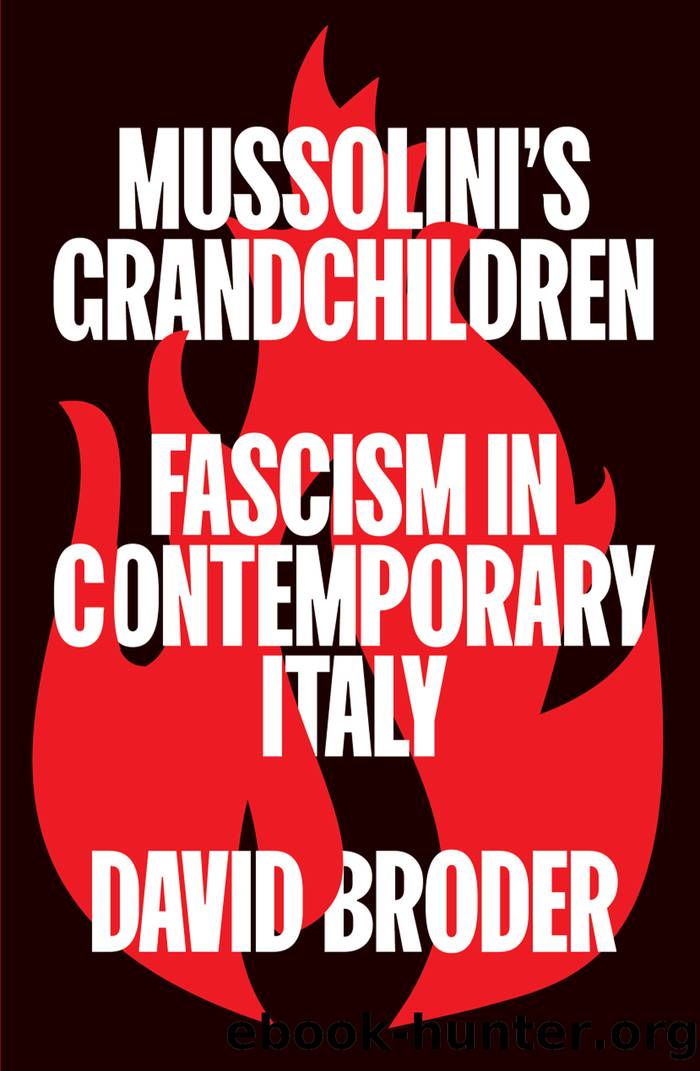Mussolini's Grandchildren by Broder David;

Author:Broder, David;
Language: eng
Format: epub
Publisher: Pluto Press
OUT OF THE PARTY
Fini had become the leader of the MSI youth, then the party itself with Almiranteâs personal blessing, but increasingly became a liberal âmoderniserâ in conflict with his party. With the end of the Cold War and the Italian political system based upon it, he led the veterans of the MSI over a series of hurdles, in the attempt to form a broader party which could mould the Second Republic. Some Christian Democrats congratulated him on the bid to form a ânormalâ right. Each time, there was a progressive distancing of his party from an identity focused on neofascist assumptions and a growing separation between judgements on the MSI tradition and the historical regime. This required several stages, from the first project for the Alleanza Nazionale, to the formal dissolution of the MSI, to the condemnation of the âabsolute evilâ and, finally, to Finiâs own âidentif[ication] with antifascist valuesâ. Each such statement came with multiple qualifications and contradictions; often the tone of the intervention and the backlash against it, notably in the case of the 2003 visit to Israel, had a broader effect on public perception than the literal content of what was said. But through all this we see that the political normalisation of a post-fascist party was not just an artefact of its obedience to antifascist speech codes, but rather a by-product of its involvement in government. Berlusconi was often less bound to pay even formal or conditional respect to antifascism than Fini, making many statements that trivialised Mussoliniâs rule and the âholidaysâ on which he sent opponents. Only on 25 April 2009, four weeks after the two parties fused, would Berlusconi mark Liberation Day for the first time, 15 years after he first became prime minister.
What Berlusconi in 2019 called the âlegitimisationâ and âconstitutionalisationâ of âthe Lega and the fascistsâ also had a contradiction in the norm erosion in which he was himself involved. While corruption had already become a highly visible political issue in Mani Pulite, the governments which Berlusconi led â allied to his own personal involvement in multiple criminal cases â intensified a strong politicisation of the justice system and its decisions, which in turn embroiled his allies. His party raised to high office figures steeped in organised crime and the P2 masonic lodge, and passed ad personam legislation designed to protect his business interests; and he was banned from public office in 2013 after his definitive conviction for tax fraud. Many current Fratelli dâItalia leaders who joined the MSI in the early 1990s, including Meloni, claim that they first entered politics in response to the murder of antimafia prosecutor Paolo Borsellino; the party claimed to be âcleanâ and âhonestâ unlike the âpartyocracyâ. They would later vote to protect associates such as Marcello dellâUtri â later jailed for his historic role as a mediator between Berlusconi and Cosa Nostra mafiosi â from prosecution, and indeed to back up Berlusconiâs story that he had pressured Milan police to release the teenage prostitute Karima
Download
This site does not store any files on its server. We only index and link to content provided by other sites. Please contact the content providers to delete copyright contents if any and email us, we'll remove relevant links or contents immediately.
| Africa | Americas |
| Arctic & Antarctica | Asia |
| Australia & Oceania | Europe |
| Middle East | Russia |
| United States | World |
| Ancient Civilizations | Military |
| Historical Study & Educational Resources |
Never by Ken Follett(2869)
The Man Who Died Twice by Richard Osman(2289)
Machine Learning at Scale with H2O by Gregory Keys | David Whiting(2263)
Fairy Tale by Stephen King(2058)
Will by Will Smith(2032)
Rationality by Steven Pinker(1759)
The Dawn of Everything: A New History of Humanity by David Graeber & David Wengrow(1564)
The Dark Hours by Michael Connelly(1562)
Principles for Dealing With the Changing World Order: Why Nations Succeed and Fail by Ray Dalio(1368)
Friends, Lovers, and the Big Terrible Thing by Matthew Perry(1320)
A Short History of War by Jeremy Black(1295)
HBR's 10 Must Reads 2022 by Harvard Business Review(1251)
Go Tell the Bees That I Am Gone by Diana Gabaldon(1231)
Can't Hurt Me: Master Your Mind and Defy the Odds - Clean Edition by David Goggins(1218)
515945210 by Unknown(1205)
Fear No Evil by James Patterson(1103)
443319537 by Unknown(1069)
Works by Richard Wright(1017)
Going There by Katie Couric(987)
